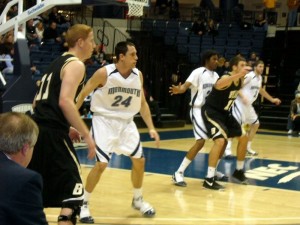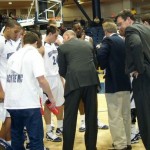Unbelievable! Just when fans are beginning to digest the news that Monmouth University’s best men’s basketball player Travis Taylor is leaving both the team and the school we get hit with the news that Justin Sofman is also leaving. In an entry on the Hawks Nest blog earlier this week it was reported that Sofman has basically lost his love and passion for the game of basketball. Here are some of Sofman’s quotes regarding leaving the team and the game of basketball:

Justin Sofman is the Latest to Leave
By the way, none of the Hawks pictured are returning
Sofman said he can no longer “take the culture of it, the negativity, the yelling and screaming (of the coaches) if my heart is not in the game.”
“Maybe if I felt different about the game of basketball I would buy into everything,” Sofman said.
“I’m 21 years old. I’m not going to tell him (Calloway) how to do his job. I’m a psychology major. I’m not a coaching major.”
“I’m not going to get into how to motivate players and how to coach because I don’t know.”
“Just because I disagree with something doesn’t mean anything. What I do know is I didn’t feel motivated personally.”
“I didn’t agree with a lot of things. But how are you going to agree when you get screamed at all day, every day.”
“I wasn’t looking forward to next year without Travis, sort of,” Sofman said. “(Without Travis) it made it easier maybe (to leave). I think it’s better for the team and myself I part ways.”
Sofman said Calloway is not out of the ordinary in how he handles players from any of his other coaches dating back to high school.
“I’ve had my share of negative screamers,” Sofman said. “I’ve had the worst ones on purpose to get me ready for the next level.”
“The only difference was I was naive then and wasn’t as adult as I am now. The fact is I could take it back then and now it drives me nuts.”
“You can’t talk to an adult like that and expect to get results.”
Sofman said he liked Calloway as a person. “We had a nice conversation today (Tuesday),” Sofman said. “It’s just a conflict of working for him.”
I have mixed feelings on Sofman leaving the team because I think that he is a good player and a great asset to the team on many fronts. However, as a former high school athlete (and a pretty damn good one, too), I absolutely understand that feeling of completely losing interest in a sport in which you were once a fierce competitor.
Story Time! When I was in high school I was a pretty good wrestler. I wasn’t state championship material by any means, but I was pretty damn good. However, somewhere in the middle of wrestling season during my senior year in high school I began to really not give a damn about the sport any more (which was pretty bad since I was Captain of the team). I definitely continued to compete at a high level, but I didn’t want to win for the good of the team or for my personal advancement; more than anything else I wanted to win matches for personal pride. I’m not sure what caused me to not give a damn any more, but over the years I’ve begun to accept the notions that 1) I saw no professional or semi-professional athletic future for myself and 2) I subconsciously didn’t buy the “hype” that our coaches sold to us on a daily, weekly, monthly, and yearly basis.
From Sofman’s quotes above, it sounds like he was in the same situation. When I read Sofman saying that he can no longer take the “culture of it” and that if he “felt different about the game of basketball [he] would buy into everything,” the very same feelings conjure up in my head that I had during my senior year of high school wrestling. Specifically, it’s the idea that you have to “buy into everything” that really piques my interest. Anyone who has played a competitive sport under a good coach at a competitive high school or college knows that coaches all have their own unique motivation techniques. Some yell, some scream, some run you into the ground, some speak softly and carry a big stick – it’s part of their style as a coach. A good coach will tailor his or her motivation techniques to lead his or her athletes to a bigger picture, larger goal, or greater accomplishment.
It sounds like Sofman didn’t want to deal with Dave Calloway or his coaching staff’s motivation techniques because he no longer saw the bigger picture, wanted to attain a larger goal, or even believed that there was a greater accomplishment.
Again, if this is how Sofman really feels (and we have no reason to doubt him), then I can’t really blame the kid for making this decision. I remember how my wrestling coaches told me that if I wrestled 100 competitive matches (or more) during the off-season that I’d come back better than my competition. So… I did just that. I wrestled over 100 matches during each of my off-seasons. That’s 100+ matches after my Freshman year of wrestling, 100+ matches after my Sophomore year of wrestling, and 100+ matches after my Junior year of wrestling. Was I better than my competition? Ehhh… it’s debatable. There were certain guys that didn’t last 30 seconds wrestling against me and there were other guys that I never beat. At the end of the day and after more than a decade to consider some of these issues, I don’t think that I was any better off because of those 300+ matches that I wrestled in the off-season.
I don’t write this stuff as a bitter ex-athlete. Not at all, actually. In fact, I look back on my days as a high school athlete with very happy and exciting memories! But as Sofman says in his quotes above, I’m an adult now and I see the system that I went through for what it really was – a prolonged motivation technique that, for the vast majority of high school athletes, doesn’t help them truly excel beyond their competition. It seems that Sofman has come to this realization, too. In fact, when I read his quote of, “You can’t talk to an adult like that and expect to get results,” I pretty much know that he’s done with these motivation techniques to push him to a greater accomplishment. And I completely understand.
All of that said, I’d still encourage kids to get involved with competitive sports while in school. Competition builds a certain character and, while these athletes are young teenagers, the camaraderie of a team helps them to develop the necessary social skills that they’ll need in many aspects of their adult lives. However, when all is said and done I appreciate where Sofman is coming from because I appreciate that sometimes you have to know when to say when.




























































































